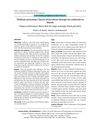 September 2023 in “Clinical, cosmetic and investigational dermatology”
September 2023 in “Clinical, cosmetic and investigational dermatology” A patient with a rare form of lupus improved after treatment for skin ulcers and hair loss on the face and scalp.
 March 2011 in “Journal of clinical and experimental investigations”
March 2011 in “Journal of clinical and experimental investigations” Thallium poisoning can cause hair loss, skin rashes, and nerve damage, and can be fatal if not correctly diagnosed and treated.
 9 citations,
January 2018 in “American Journal of Men's Health”
9 citations,
January 2018 in “American Journal of Men's Health” Finasteride use can cause lasting negative effects like sexual dysfunction, depression, anxiety, and cognitive issues.
 2 citations,
May 2009 in “Medicine”
2 citations,
May 2009 in “Medicine” Hair and nails can help diagnose diseases, with nail issues often linked to skin conditions and hair loss having various causes and treatments.
 December 2019 in “Mehmet Akif Ersoy Üniversitesi Sağlık Bilimleri Enstitüsü dergisi”
December 2019 in “Mehmet Akif Ersoy Üniversitesi Sağlık Bilimleri Enstitüsü dergisi” One cat with low thyroid hormone had growth issues, and another with high thyroid hormone had skin problems; both got better with treatment.
 July 2018 in “Elsevier eBooks”
July 2018 in “Elsevier eBooks” Up to half of people experience itchy scalp, often due to skin conditions like seborrheic dermatitis or psoriasis, and treatments vary based on the specific cause.
 63 citations,
March 2016 in “International Journal of Molecular Sciences”
63 citations,
March 2016 in “International Journal of Molecular Sciences” Children with atopic dermatitis often have sleep problems due to itching and may benefit from melatonin, which helps with sleep and skin symptoms.
 53 citations,
December 2015 in “JAMA Dermatology”
53 citations,
December 2015 in “JAMA Dermatology” Women with PCOS often have more body hair, acne, and skin darkening, and these signs are linked to metabolic issues like insulin resistance and high cholesterol.
 9 citations,
February 2004 in “Clinical and Experimental Ophthalmology”
9 citations,
February 2004 in “Clinical and Experimental Ophthalmology” The document discusses various eye conditions and their treatments, including a rare eye cancer in a baby, vision loss from a cancer drug, cataracts from a baldness treatment, a rare skin disorder, and a specific type of eye disease diagnosed with a special imaging technique.
 4 citations,
September 2021 in “Frontiers in allergy”
4 citations,
September 2021 in “Frontiers in allergy” The conclusion is that understanding the complex relationship between allergies, autoimmunity, and psychological factors is key to treating skin disorders with itching.
 1 citations,
December 2021 in “Medical Records”
1 citations,
December 2021 in “Medical Records” The COVID-19 pandemic led to fewer dermatology visits, older and more male patients, and more stress-related skin issues.
 1 citations,
July 2020 in “Dermatology”
1 citations,
July 2020 in “Dermatology” Photobiomodulation helps reduce pain, lessen inflammation, heal wounds, and can be used in skin treatments. It also boosts hair growth in women with hair loss and may help fight microbes and prevent respiratory issues in COVID-19.
 1 citations,
May 2016 in “The Nurse Practitioner”
1 citations,
May 2016 in “The Nurse Practitioner” Treating PCOS is complex, involving medication like metformin and lifestyle changes, and requires attention to mental health due to high depression and anxiety rates.
 November 2020 in “Elsevier eBooks”
November 2020 in “Elsevier eBooks” Antiandrogens and androgen inhibitors like spironolactone, finasteride, and dutasteride can treat hair loss and skin conditions, but they have risks and side effects, including potential harm to pregnant women and risks of cancer and heart issues. Herbal remedies also have antiandrogenic effects but lack safety validation.
 March 2002 in “Clin-Alert”
March 2002 in “Clin-Alert” In 2002, various drugs caused serious side effects, including vitamin B12 deficiency, heart issues, blindness, hypersexuality, allergic reactions, blood clotting problems, pupil dilation, capillary leak syndrome, muscle breakdown, hepatitis, skin reactions, and lupus.
 March 2024 in “Poster presentations”
March 2024 in “Poster presentations” Anifrolumab improves quality of life and reduces steroid use in SLE patients.
 July 2023 in “Dermatology practical & conceptual”
July 2023 in “Dermatology practical & conceptual” Women with Female Pattern Hair Loss may experience more stress, anxiety, and depression, and have lower levels of BDNF, which could predict the psychological impact.
 November 2022 in “Journal of Investigative Dermatology”
November 2022 in “Journal of Investigative Dermatology” Acne is genetically linked to a higher risk of depression, anxiety, schizophrenia, and bipolar disorder, with the strongest link to bipolar disorder.
 6 citations,
November 1996 in “Archives of Dermatology”
6 citations,
November 1996 in “Archives of Dermatology” G-CSF effectively treated a teenager's cyclic neutropenia and reduced her symptoms without adverse effects.
 1 citations,
August 2017 in “British Journal of Dermatology”
1 citations,
August 2017 in “British Journal of Dermatology” Sodium hypochlorite can effectively prevent and remove Staphylococcus aureus biofilms in atopic dermatitis at high enough concentrations.
 October 2023 in “Journal of the European Academy of Dermatology and Venereology”
October 2023 in “Journal of the European Academy of Dermatology and Venereology” Patients with skin diseases rated psychological effects as most impactful, needing a treatment approach that addresses both mind and body.
 100 citations,
July 2004 in “The Journal of Sexual Medicine”
100 citations,
July 2004 in “The Journal of Sexual Medicine” Hormones like estrogen, testosterone, progesterone, and prolactin play complex roles in female sexual function, with testosterone potentially improving sexual desire, arousal, and satisfaction. However, more research is needed to establish safe and effective hormone treatments for female sexual dysfunction.
 86 citations,
January 2008 in “Journal of nutritional & environmental medicine”
86 citations,
January 2008 in “Journal of nutritional & environmental medicine” Green tea may help with health issues like cancer, heart disease, and weight loss due to its high catechin content.
 73 citations,
May 1976 in “JAMA”
73 citations,
May 1976 in “JAMA” Long-term parenteral nutrition without zinc can cause severe zinc deficiency.
 64 citations,
January 1998 in “Drugs”
64 citations,
January 1998 in “Drugs” Dienogest combined with ethinylestradiol is a highly effective birth control that improves menstrual symptoms and has manageable side effects.
58 citations,
January 2010 in “Arthritis Care & Research” Hydroxychloroquine may help delay skin damage in lupus patients.
 46 citations,
September 2003 in “International Journal of Dermatology”
46 citations,
September 2003 in “International Journal of Dermatology” Trichodynia found in 29% of TE or AGA patients, linked to psychological conditions.
 25 citations,
January 2013 in “Journal of Industrial and Engineering Chemistry”
25 citations,
January 2013 in “Journal of Industrial and Engineering Chemistry” Some herbal extracts, especially when used in cubosomal suspensions, were as effective as Minoxidil in promoting hair growth.
 24 citations,
September 2014 in “Drug Delivery”
24 citations,
September 2014 in “Drug Delivery” Using microneedles before applying eflornithine cream can make it more effective at stopping hair growth.
 20 citations,
September 2020 in “International journal of computer applications”
20 citations,
September 2020 in “International journal of computer applications” The Random Forest algorithm was the most accurate at diagnosing Polycystic Ovarian Syndrome.





























